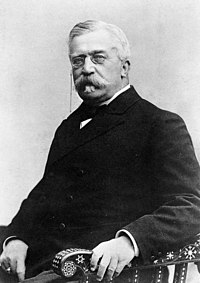Karl Heinrich von Boetticher
Karl Heinrich von Boetticher | |
|---|---|
 Karl Heinrich von Boetticher in 1880 | |
| Vice-Chancellor of the German Empire | |
| In office 20 June 1881 – 1 July 1897 | |
| Chancellor | Otto von Bismarck |
| Preceded by | Otto Graf zu Stolberg-Wernigerode |
| Succeeded by | Arthur von Posadowsky-Wehner |
| Secretary of the Interior of German Empire | |
| In office 1 September 1880 – 1 July 1897 | |
| Chancellor | Otto von Bismarck (1871–1890) Leo von Caprivi (1890–1894) Chlodwig, Prince of Hohenlohe-Schillingsfürst (1894–1900) |
| Preceded by | Karl Hofmann |
| Succeeded by | Arthur von Posadowsky-Wehner |
| Member of the Reichstag | |
| In office 1878–1879 | |
| Constituency | Schleswig-Holstein 2 |
| Personal details | |
| Born | 6 January 1833 Stettin, Pomerania, Prussia |
| Died | 6 March 1907 (aged 74) Naumburg, Province of Saxony, Prussia |
| Nationality | German |
| Political party | Free Conservative Party |
| Alma mater | University of Würzburg University of Berlin |
| Occupation | Lawyer |
Karl Heinrich von Boetticher (6 January 1833 – 6 March 1907) was a German conservative statesman. He served as the secretary of the Interior (1880–1897), and the vice-chancellor of the German Empire (1881–1897).
Biography
Born in Stettin in Pomerania, the son of a judge, Boetticher studied law in the University of Würzburg and the University of Berlin. He was governor of Schleswig in 1876. In 1878 he became a member of the Reichstag for the Free Conservative Party. In 1879, he was lieutenant general of the province of Schleswig-Holstein. In 1880 he succeeded Karl von Hofmann as Secretary of the Interior of the German Empire. In 1881, he also became vice chancellor in Bismarck's cabinet. He held both positions until 1897.
As the representative of Chancellor Bismarck, Boetticher introduced numerous social reforms, and the enactment of the invalid and old-age insurance laws in 1889 was due principally to his energy and executive ability.
Honours
He received the following orders and decorations:[1]
 Kingdom of Prussia:
Kingdom of Prussia:
- Knight of the Black Eagle, with Collar
- Grand Commander's Cross of the Royal House Order of Hohenzollern, with Star
- Landwehr Service Medal, 1st Class
 Duchy of Anhalt: Grand Cross of the Order of Albert the Bear
Duchy of Anhalt: Grand Cross of the Order of Albert the Bear Austria-Hungary: Grand Cross of the Imperial Order of Leopold
Austria-Hungary: Grand Cross of the Imperial Order of Leopold Baden: Knight of the Order of Berthold the First, 1884[2]
Baden: Knight of the Order of Berthold the First, 1884[2]

 Ernestine duchies: Grand Cross of the Saxe-Ernestine House Order
Ernestine duchies: Grand Cross of the Saxe-Ernestine House Order Grand Duchy of Hesse:[3]
Grand Duchy of Hesse:[3]
- Grand Cross of the Merit Order of Philip the Magnanimous, 28 March 1886
- Grand Cross of the Ludwig Order, 31 May 1889
 Empire of Japan: Grand Cordon of the Rising Sun
Empire of Japan: Grand Cordon of the Rising Sun Mecklenburg: Grand Cross of the Wendish Crown, with Golden Crown
Mecklenburg: Grand Cross of the Wendish Crown, with Golden Crown Netherlands: Grand Cross of the Netherlands Lion
Netherlands: Grand Cross of the Netherlands Lion Oldenburg: Grand Cross of the Order of Duke Peter Friedrich Ludwig
Oldenburg: Grand Cross of the Order of Duke Peter Friedrich Ludwig
References
Literature
- This article incorporates text from a publication now in the public domain: Gilman, D. C.; Peck, H. T.; Colby, F. M., eds. (1905). . New International Encyclopedia (1st ed.). New York: Dodd, Mead.
